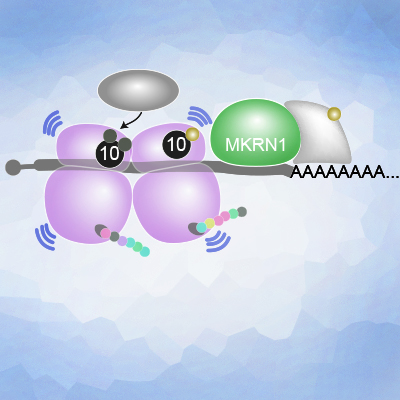The poly(A) detector: how cells avoid making toxic proteins
Researchers at the Institute of Molecular Biology (IMB) in Mainz, Germany have discovered a new route used by cells to avoid making defective proteins. In their paper published in Genome Biology, the research groups led by Dr Petra Beli and Dr Julian König show how MKRN1 acts as a sensor for detecting abnormal mRNAs and blocks them from being translated into aberrant proteins that can be toxic to the cell.
Proteins are the building blocks of cells and must be constantly produced. However, the protein production process needs to be tightly controlled as there are many chances for mistakes. One crucial step of protein production is mRNA polyadenylation, when the mRNA is cleaved and a long row of adenosines, called a poly(A) tail, is added. Sometimes the mRNA is mistakenly cut early in its sequence and the poly(A) tail is added to the now shortened mRNA. This is called premature polyadenylation. Translation of these shortened mRNAs creates non-functional proteins that can form toxic aggregates and contribute to neurodegenerative disease. To prevent this, cells have an in-built quality control mechanism that detects faulty mRNAs and stops ribosomes from translating them. However, until now scientists did not know how premature poly(A) sequences are recognised and how they stop translation.
In a joint study, the research groups of Petra Beli and Julian König (IMB) along with Kathi Zarnack (Goethe University Frankfurt) show that Makorin Ring Finger Protein 1 (MKRN1) binds to and is essential for stopping translation at poly(A) sequences. MKRN1 may therefore act as a sensor allowing the cell to detect faulty mRNAs with premature poly(A) tails and stop their translation as early as possible.
For the full press release, click here.
